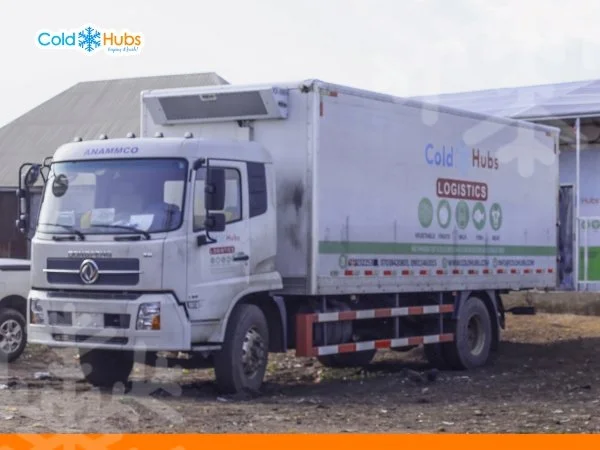The Cold chain industry plays a very significant role in storage and transportation of agricultural produce and other perishables. Emerald publication in his research on Food cold chain Management defined Cold Chain industry as the planning, implementing, and controlling the flow and storage of perishable goods, related services and information to enhance customer value to ensure low cost.
Perishable fresh agricultural produce like vegetables, fruits, milk, frozen food, seafood, chemicals, and pharmaceutical drugs requires a precise temperature-controlled atmosphere along the supply chain, that is, from production to the end users.
The perishability of the goods, waste, spoilage, and the economic losses incurred are the key inventions of cold chain logistics.
It gave rise to cold chain industries in Africa like ColdHubs, which uses its innovation and clean energy (a solar-powered refrigerated truck) to reduce food waste and increase food security for under-developed countries.
The United Nations revealed that food wastage in Nigeria per citizen is the highest in Africa. The reports noted that Nigerians lose at least 189 kilograms of food every year, resulting in a total of 37.9 million (37,941,470) metric tons of food every 12 months.
In their journey to salvage food waste in Africa and promote agricultural value, cold chain companies are faced with risks and challenges that reduce their chances of survival.
Operating as a cold chain industry in Nigeria, Coldhubs has been faced with challenges that hinder its ability to effectively transport and store temperature-sensitive goods, such as food, vegetables and fruits, vaccines, and other perishable produce, as disclosed by the logistics team.
The company x-rays some of the problems cold chain industries face in third-world countries.
"It's been 8 years of operation, and Coldhubs is still pushing and hoping that our social impacts are being felt all over Africa. We cannot say it has been a smooth road." "As there are a lot of constraints withholding the success of the cold chain operation, reaching out to the people (farmers, traders) to patronize or adopt a system they are not used to is a lot of work. We put a lot of effort and funds into organizing post-harvest management training, seminars, webinars, and so many local sensitization and campaigning activities while they should adopt the cold logistics system."
"Government regulations, labor shortages, climate change, the cost of equipment, and import charges are among the enormous issues encountered in the business," the Senior Supply Chain Officer, Princewill Chinedu Dike, revealed.
Using an analysis of some of the experiences shared by Coldhubs Logistics staff and other logistics companies in Africa, we will discuss five major problems faced by cold chains in Africa.
1. Government Regulations
Every nation has its own peculiarities in terms of costs and legal fees for operating a logistics company. The cost of importing trucks and other technological equipment that aids the cold logistics business is alarming in sub-Saharan countries like Nigeria. The government continuously changes existing frameworks and introduces new compliances that affect the growth of businesses and start-up companies.
2. Cost of Equipment
The cold chain equipment plays an important role in food safety, food hygiene, health, and the environment.
Therefore, to maintain its role in society and for a successful supply chain, there is a need to purchase hybrid machines and cooling trucks that will serve the populace and render diligent cold service to their customers.
Third-world countries purchase some of this equipment in the western world, where there are exchanges of currencies. In most cases, importation and customs fees are higher than the price of the goods purchased.
This can limit the progress of cold-chain industries in Africa.
3. Insufficiency Expertise: the shortage of manpower and expertise is the major challenge the industry is faced with. This challenge has caused a major setback in the growth of the cold chain industry and slowed down operational activities.
Professionals that understand the technicality or modality of cold facilities are needed in African countries to cut down on lapses and greater agitation about the processes that logistics and delivery companies face. The cold chain industry in Nigeria requires skilled personnel to operate and maintain the equipment, as improper handling of temperature-sensitive products can lead to spoilage.
4. Climate Change and Environmental Degradation: Climate change reflects the variations in the average daily weather conditions, such as temperature, humidity, rainfall, and sunshine, of a location over an extended period. Climate change in Nigeria threatens economic growth in sectors dependent on climatic conditions.
5. Poor Transportation: The transportation system in Nigeria is inadequate, and this affects the efficiency of the cold chain industry. Poor road conditions, traffic congestion, and the lack of refrigerated transportation make it challenging to transport temperature-sensitive products.

